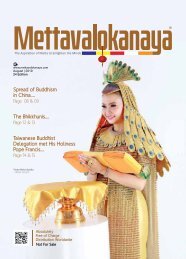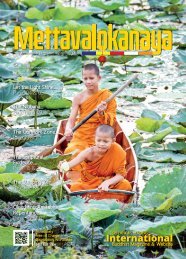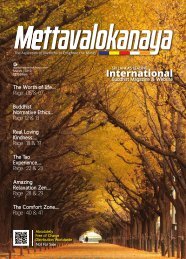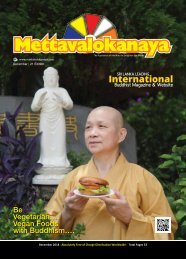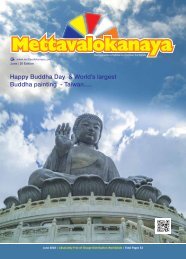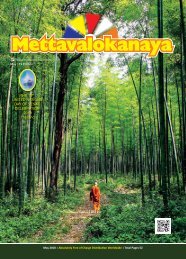mettavalokanaya_buddhist_magazine_january_2021.
This is the Sri Lankan's Most Popular & Leading Monthly International Buddhist Magazine, “Mettavalokanaya” on January - 2021 Edition - 30. “Mettavalokanaya” International Buddhist Magazine has been successfully distributed to 40 countries worldwide. Specially distributed to Overseas High Buddhist Monks, Masters, Nuns, Worldwide famous Buddhist Monasteries & Associations, International Buddhist conferences and Forums. “Mettavalokanaya” International Monthly Buddhist Magazine has been awarded as the “2018 - The Global Buddhist Ambassador Award” from Thailand as the World’s Best and Most popular Buddhist Magazine. The Mettavalokana Buddhist Publications Centre is a registered Buddhist Publications Centre in Sri Lanka and has received many International accolades. Our publications are absolutely free of charge to general public. The magazine comprises of special articles on Buddhism written by leading Buddhist Monks from foreign countries. “Mettavalokanaya” is currently been published in English and includes full color 60 pages.
This is the Sri Lankan's Most Popular & Leading Monthly International Buddhist Magazine, “Mettavalokanaya” on January - 2021 Edition - 30. “Mettavalokanaya” International Buddhist Magazine has been successfully distributed to 40 countries worldwide. Specially distributed to Overseas High Buddhist Monks, Masters, Nuns, Worldwide famous Buddhist Monasteries & Associations, International Buddhist conferences and Forums. “Mettavalokanaya” International Monthly Buddhist Magazine has been awarded as the “2018 - The Global Buddhist Ambassador Award” from Thailand as the World’s Best and Most popular Buddhist Magazine. The Mettavalokana Buddhist Publications Centre is a registered Buddhist Publications Centre in Sri Lanka and has received many International accolades. Our publications are absolutely free of charge to general public. The magazine comprises of special articles on Buddhism written by leading Buddhist Monks from foreign countries. “Mettavalokanaya” is currently been published in English and includes full color 60 pages.
Create successful ePaper yourself
Turn your PDF publications into a flip-book with our unique Google optimized e-Paper software.
Veganism
Values of Buddhism….
According to the Five Precepts
(pañca-sila), “Panatipata
veramani sikkhapadam
samadiyam”. That means, I
undertake the precept to refrain from
destroying living creatures. This rule is
observed by all practicing lay Buddhists.
The precepts are often recited after
reciting the formula for taking refuge
in the Buddha, Dhamma, and Sangha.
Meat was part of the ancient human
diet, though at much lower levels
than today, especially in industrialized
nations. Although there is evidence that
ancient humans hunted and consumed
meat after the last ice age 10,000 to
12,000 years ago, based on art and
bones collected, it would have been
difficult to harvest enough meat to
feed growing populations, especially as
populations increased rapidly during the
world’s agricultural revolution.
People who choose vegetarian
or vegan diets often learn more about
nutrition and the importance of various
food groups and nutrients. As a result,
they can make better food choices
and tend to be more health conscious.
A vegan diet that’s naturally high in
antioxidants, fiber and low in saturated
fats seems to be able to lower the risk of
cognitive decline and neurodegenerative
diseases. Retail experts predict the
future of plant-based diets includes
both meat and dairy alternatives, as
well as cultured meat, and that tofuand
seitan-based meat replacements
may continue rising in popularity.
Vegan meat replacements that actually
mimic meat’s texture and flavor also
are forthcoming, with several products
already on the market. Consumer trends
point to the fact that interest continues
to increase and money spent on plantbased
products climbs each year. As
interest grows, registered dietitian
nutritionists in any area of practice can
benefit from understanding plant-based
nutrition as well as being able to counsel
patients and clients on plant-based
eating.
According to the Vegetarianism
History, there also is evidence of ancient
vegetarianism in the Maurya Dynasty
(304 to 232 B.C.), when Buddhist
vegetarian advocate Indian Emperor
Ashoka encouraged people to care for
animals in an attempt to stop animal
sacrifice. Additionally, ancient Japanese
Emperor Tenmu banned people from
eating wild animal meat during certain
times of the year in the late 6th century
and through the 19th century. The Vegan
Society may have been established
75 years ago but veganism has been
around much longer. Evidence of people
choosing to avoid animal products can
be traced back over 2,000 years. As
early as 500 BCE, Greek philosopher and
mathematician Pythagoras promoted
benevolence among all species and
followed what could be described as a
vegetarian diet. Around the same time,
Siddhārtha Gautama (better known as
the Buddha) was discussing vegetarian
diets with his followers.
Definition of Veganism - Veganism
represents a philosophy and way of
living which seeks to exclude—as far
as is possible and practicable—all
forms of exploitation of, and cruelty
to, other animals for food, clothing or
any other purpose; and promotes the
development and use of animal-free
alternatives for the benefit of humans,
other animals and the environment. In
dietary terms veganism means doing
away with all products derived wholly
or partly from other animals. It also
means not wearing animal skins and fur
(leather, feather, fur, wool and silk), or
using products that have been tested
on animals. Unfortunately, all medicines
have been tested on other animals
due to regulatory requirements, and it
may be hard to avoid them at times or
to find alternatives for some medical
treatments. Just like veganism is the
sustainable option when it comes to
looking after our planet, plant-based
living is also a more sustainable way
of feeding the human family. A plantbased
diet requires only one third of
the land needed to support a meat
and dairy diet. With rising global food
and water insecurity due to a myriad
of environmental and socio-economic
problems, there’s never been a better
time to adopt a more sustainable way
of living. Avoiding animal products
is not just one of the simplest ways
an individual can reduce the strain
on food as well as other resources,
it’s the simplest way to take a stand
against inefficient food systems which
disproportionately affect the poorest
people all over the world.
November 1 is World Vegan Day,
a celebration of people who don’t
eat meat. Or eggs. Or cheese. Or
mayonnaise. Or honey. Or whey. Or
gelatin. Or anything that comes from
or includes an animal. Nor do they use
any clothing, accessory or object made
from an animal. No leather, no wool,
no pearls, no ivory-keyed pianos. The
animal-free holiday began in 1994, to
commemorate the 50th anniversary
of the Vegan Society. Veganism is an
extreme form of vegetarianism, and
though the term was coined in 1944.
The first vegetarian society was formed
in 1847 in England. Three years later,
Rev. Sylvester Graham, the inventor
of Graham crackers, co-founded the
American Vegetarian Society. Graham
was a Presbyterian minister and his
followers, called Grahamites, obeyed
his instructions for a virtuous life:
vegetarianism, temperance, abstinence,
and frequent bathing. In November
1944, a British woodworker named
Donald Watson announced that because
vegetarians ate dairy and eggs, he
was going to create a new term called
“vegan,” to describe people who did
not. Tuberculosis had been found in 40%
of Britain’s dairy cows the year before,
and Watson used this to his advantage,
claiming that it proved the vegan lifestyle
protected people from tainted food.
Three months after coining the term,
he issued a formal explanation of the
way the word should be pronounced:
“Veegan, not Veejan,” he wrote in his
new Vegan Society newsletter, which
had 25 subscribers.
Strict veganism prohibits the use
of animal product, even if it isn’t food,
but like any lifestyle choice that ends
in “-ism,” there are plenty of people
who cheat. The vitamin B12 is found
almost entirely in animal products, so
many vegans eat fortified food or take
a vitamin to get the right amount. And
while American vegetarianism has
broken free of its philosophical and
religious roots, becoming an accepted
health choice — many restaurants offer
vegetarian options and most dinner
party planners now ask “is anyone
vegetarian?” before planning the menu
— veganism is still tied to the animalrights
movement and is out there on the
fringe.
“Protect Animal’s
Freedom Life”….
Taiwan
Most Venerable
Bhikkhuni Yen Ding
24 l Mettavalokanaya l January l 2021 2021 l January l Mettavalokanaya l 25











